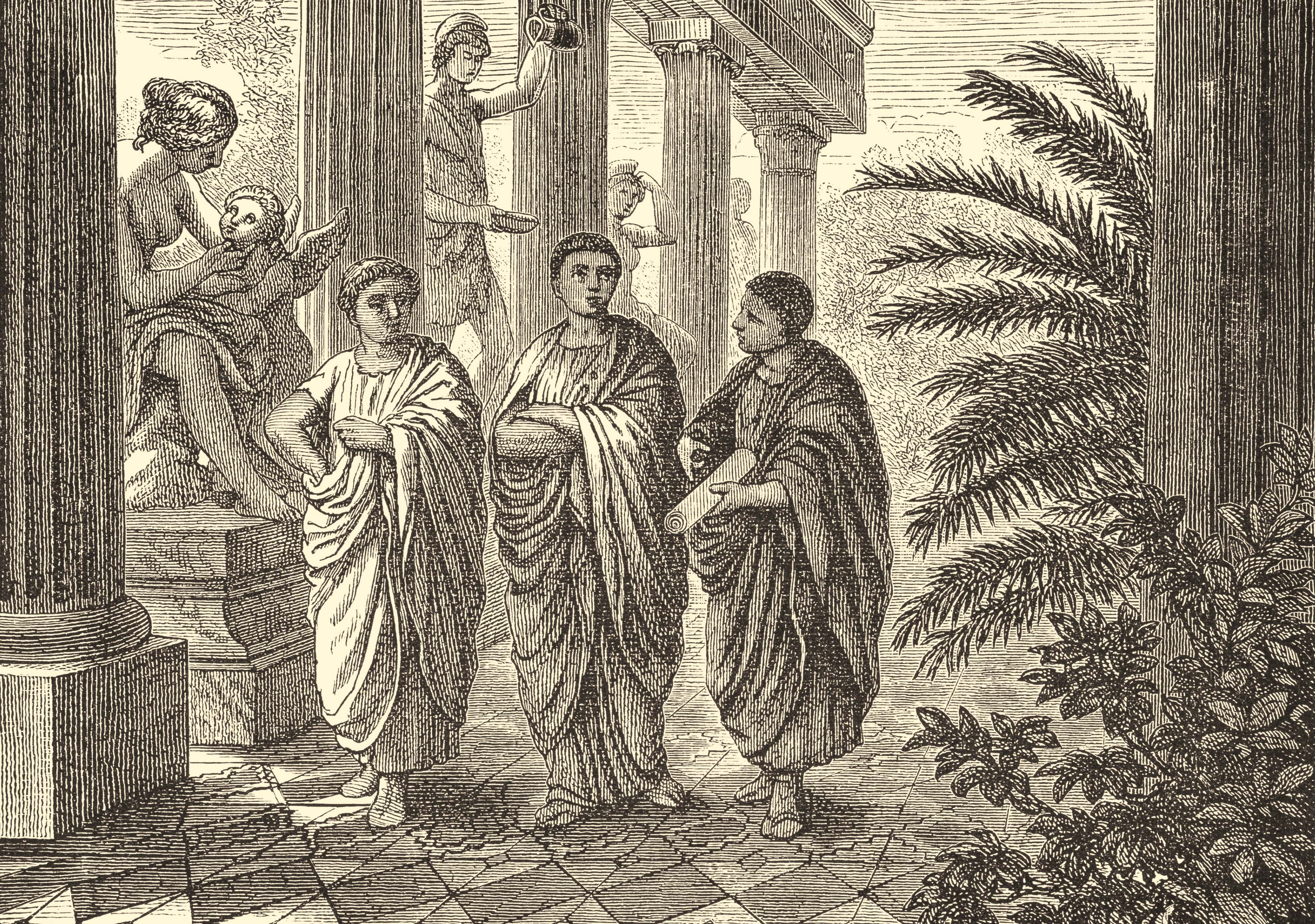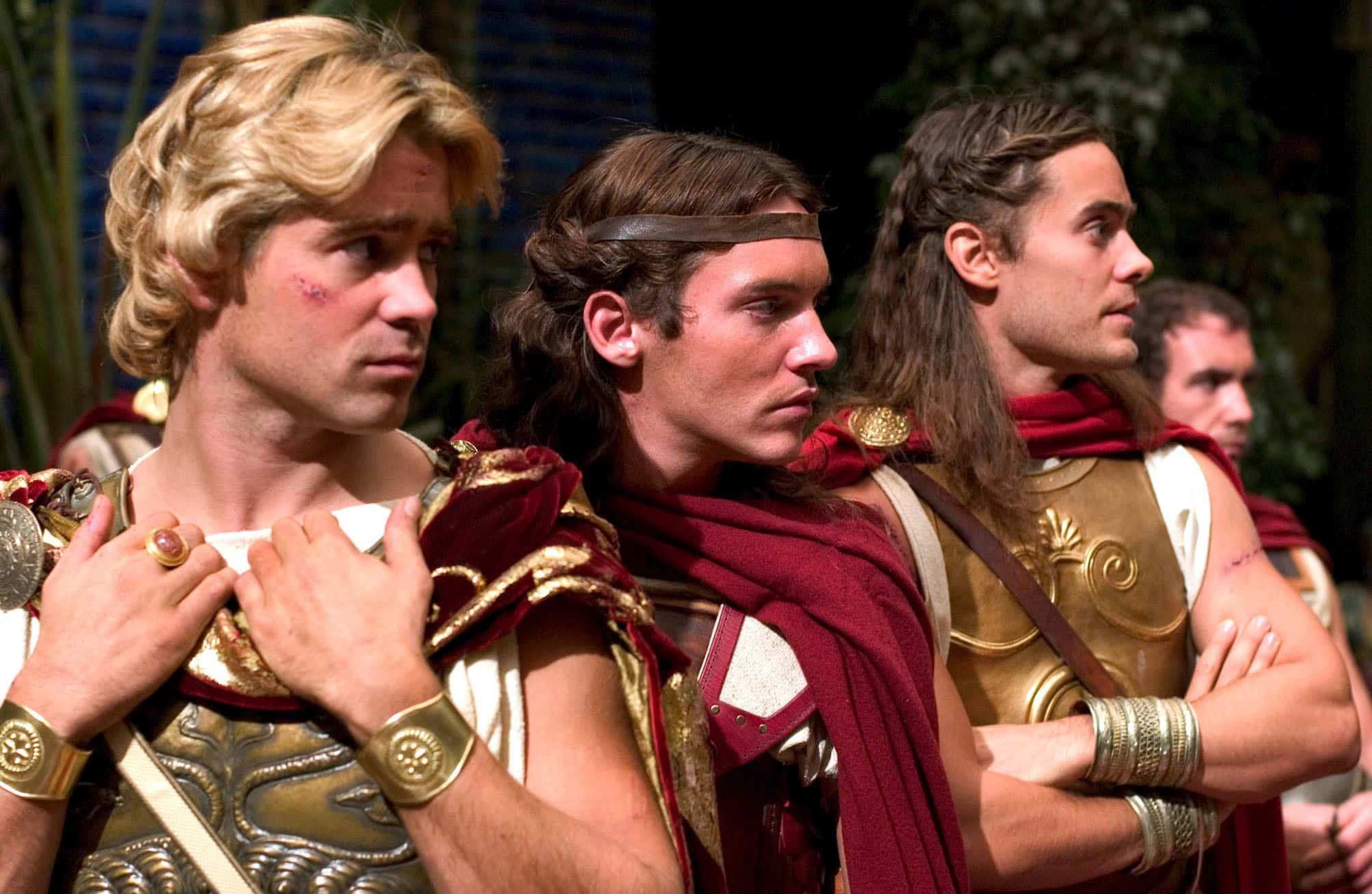“At his best, man is the noblest of all animals; separated from law and justice he is the worst.”— Aristotle
One of the great philosophers and scientists of the Hellenic age, Aristotle has shaped human knowledge for millennia after his death. In fact, he has been called the “Father of Western Philosophy” due to his immense impact the field long after his death. Aristotle was also closely linked to another huge figure in European history: the legendary conqueror Alexander the Great. Such an impactful figure who lived so long ago has inspired much speculation and investigation, yet we know very little for sure about this man’s fascinating life. However, here are some facts that could be found about this incomparably influential figure.
 pinterest
pinterest
42. Living the Noble Life
While Aristotle was famously invited by King Philip II of Macedon to tutor his son, Alexander, it was hardly the first time that Aristotle’s family had tangled with Macedonian royalty. Aristotle’s father, Nicomachus, had been the personal doctor to King Philip’s father, Amyntas III.
41. Living the Library Life in the Lyceum
With the prestige of having been Alexander’s tutor, Aristotle set himself up in Athens. He founded a library inside the famed temple to Apollo Lyceus known as the Lyceum, becoming an established scholar in his own right while also being able to say “Shhhhh” to a new generation of students.
40. He Had a Yearly Pass to All the Zoos
Despite being remembered as a philosopher, Aristotle was also the first man in human history to systematically study biology. He particularly favored the study of living things, and as such he devoted much of his writing to it. Most of this writing that we have today is focused on animals rather than plants, but that’s only because most of Aristotle’s writings on botany (the study of plants) have been lost to history.
 pinterest
pinterest
39. Thank You for Our In-Laws
Tragically, Aristotle’s mother and father both died by the time he was 13 years old. Aristotle was put into care of a man named Proxenus of Atarneus. Proxenus had married Aristotle’s older sister, Arimneste, and so became the legal guardian of the orphaned Aristotle.
38. This Rocks!
Aristotle was one of the first people in history to methodically study geology, though it wasn’t as extensive as his studies into other subjects. He made observations of such natural events as “lakes that had dried up” or “deserts that had become watered by rivers” and became one of the first men to advocate the theory that the earth’s changes are so slow that you can’t see them happen in a single lifetime.
37. “Gifted Intellectual” Was Already Taken
When you translate Aristotle’s name back into Ancient Greek, it actually means “the best purpose.” Safe to say his parents were very intuitive when they named their son!
36. We All Sometimes Want to Go Home…
It’s been determined from ancient sources that Aristotle was likely born in 384 BC. His hometown was the Ancient Greek city of Stagira, which is located in modern-day Macedonia about 34 miles from Thessaloniki.
35. Raising Future Royalty
In 343 BC, Aristotle was invited by King Philip II of Macedon to provide lessons to his 13-year-old son, Alexander. Aristotle agreed to become the head of Macedon’s royal academy, while also serving as a tutor to Prince Alexander—and I guess he did a pretty good job of it, too.
 youtube
youtube
34. Go Far, Young Grasshopper
While Aristotle laid the groundwork (no pun intended) when it came to the subject of geology, it was one of his students who would make geology his business. The philosopher known as Theophrastus took on Aristotle’s position at the Lyceum and attempted his own study of minerals and rocks, classifying them as best he could back in antiquity. He published his studies in a work titled On Stones. Bet that one just flew off the shelves.

33. How High Were His Tuition Costs??
When Aristotle was either 17 or 18 years of age, he went south to Athens in pursuit of a higher education than what he’d already gotten. Aristotle enrolled at the Academy, which was founded by Plato, another serious heavy-hitter of Ancient Greek philosophy. Aristotle would spend the next 20 years of his life at the Academy—that’s one devoted student!
32. Busy Guy
Examining the remnants of Aristotle’s writing, and taking into account how primitive science and studying were back then, it’s clear that Aristotle provided remarkable observations and theories on a wealth of subjects, including ethics, poetry, aesthetics, biology, economics, politics, physics, theatre, and music! To be fair, if you were studying for 20 years, you’d be quite the polymath too!
31. Do I Look Old to You?!
Oliver Stone’s 2004 film Alexander depicted Aristotle as having been a white-haired, elderly man when he began tutoring the young, soon-to-be conqueror. However, when Aristotle was first invited to King Philip’s court, he would have been 39 or 40. While that certainly would have been considered mature in those days, it’s still a bit of a stretch to have him played by a 75-year old Christopher Plummer.
 youtube
youtube
30. Interesting Fanbase
Noted writer and libertarian Ayn Rand considered Aristotle to be “the greatest philosopher in history” and cited him as a crucial inspiration for her way of writing and thinking. We’re not sure what Aristotle would have thought of The Fountainhead, but go figure.

29. Get My Best Side…
Given how influential his writing has been on Western thought and philosophy, it’s no surprise that Aristotle has been represented in art countless times across the centuries. Artists like Raphael, Rembrandt, Paolo Veronese, and Justus Van Ghent have all captured Aristotle on paint canvasses.
28. Putting Things Into Motion
Aristotle’s view on motion categorized it as either being violent (eg. a stone being thrown) or natural (eg. a stone being dropped from a height). Aristotle also maintained that a heavier object will fall faster than a lighter object, something which was believed for more than a thousand years after his death, and wasn’t disproven until experiments by John Philoponus and Galileo proved him wrong. Centuries after that, an astronaut on the moon was able to confirm Galileo’s assertion that objects would fall at equal speeds in a vacuum.
27. That’s My Definition and I’m Sticking to It
The term "metaphysics" was actually coined by Aristotle. He considered metaphysics to be the “first philosophy,” classifying it as theological as opposed mathematical or plain physics.
 pinterest
pinterest
26. I Was in the Cave; Now I see the Light!
In between all his other studies, Aristotle also made a primitive experiment with optics. According to his writing, he designed an apparatus to take in light to create images. He wrote about how he could manipulate the image to get different shapes. We can only imagine what he would have thought of a modern-day cinema!
 pinterest
pinterest
25. Zzzzzzzz
According to Aristotle, sleep is an essential act for humans as a result of overusing their senses and digesting food. He also determined that dreams were a result of lasting impressions from wakefulness upon a person’s senses, acting differently during a state of sleep.
24. Only Took Someone Another 2,000 Years or So…
Aristotle allegedly spent around two years observing animal life on land and in the sea, focusing on the island of Lesbos in the Aegean Sea. He made many observations of animals which Charles Darwin would also make on his own travels across the globe, such as how animals adapted to best suit their environment, and so on. One major difference between them, however, was that Darwin managed to put together the theory of evolution based on the evidence before him, while Aristotle never got that far, instead listing any mutations he noticed within a species as rare and random accidents. He also didn't address the idea of extinction of a species in his biological studies (though this was before humans had gotten good at exterminating entire species of animals).

23. Let’s Get Organized!
In his surviving writings, Aristotle identified over 500 species of different animals. He organized these animals into eleven grades, ranking them from highest to lowest based on their birthing practices. The highest-ranking animals gave live birth to hot, wet creatures, while the lowest-rankers laid cold and dry eggs. Not only that, he categorized what we would later call vertebrates and invertebrates, dividing them as creatures with blood (mammals, birds, reptiles, and fish) and creatures without blood (insects, mollusks, and crustaceans). Not quite right, but hey, he was at least on to something.
22. A Philosopher’s Progeny
During his life, Aristotle is recorded to have produced two children. He and his first wife, Pythias, had a daughter whom they also called Pythias, after her mother. After his wife's death, he became involved with a woman named Herpyllis, who bore him a son, naming him Nicomachus after Aristotle's own father.
21. The Man on the Moon
While the term "Aristotelian" has been used to describe many different scientific and philosophical phenomena, there’s one thing that’s named after him which you might not expect; there is a crater on the moon which bears the name Aristoteles, which is the classical spelling and pronunciation of Aristotle’s name!
20. How’d He Know?!
Believe it or not, Aristotle was the first person to write about Antarctica. In his book Meteorology, Aristotle conceived of a landform which would be found in the southern high-latitude region of the planet, and happened to actually be right! In honor of this, the Aristotle Mountains in Antarctica are named after him.

19. Famous Philosopher
During the so-called "Dark Ages," from 600 to 1000 AD, Aristotle’s work disappeared from general thought with the loss of knowledge of Ancient Greece. However, his work was revived in the 12th and 13th centuries, leading to translations of his writing into Latin from the original Greek. His work was also translated into Arabic by that point as well, opening a whole new audience to his influential ideas.
18. Teaching Men to be Kings
While he was teaching the young Alexander in Macedon, Aristotle also ended up providing lessons to the youths with whom the young warlord was growing up. This included his childhood friend (and possible half-brother) Ptolemy, and Cassander, who was the son of one of King Philip’s most trusted generals, Antipater. Though nobody would have predicted it at the time, both Ptolemy and Cassander would go on to become kings in their own right (Ptolemy began a dynasty of Pharaohs in Egypt and Cassander would hold the throne of Macedon during the chaos after Alexander’s death).
17. Too Old-Fashioned
After being influential into the Middle Ages, Aristotle’s theories and philosophies came to be vilified as enemies of true science. The old order clung to Aristotle’s views in the face of new discoveries made by such men as Galileo and William Harvey. Even into the 20th century, Aristotle’s reputation was viewed negatively as representative of backwards thinking. To be fair, despite his revolutionary work, he was pretty seriously wrong in many of his "scientific" ideas.
16. In Your Face, I Was Right!
Despite the fact that modern zoology would go on to correct Aristotle’s many flaws, quite a few of his observations were proved to be completely accurate! Among these include the fact that octopi make use of camouflage, and that elephants use their trunks as snorkeling equipment while swimming!
15. Well, That Tide Turned…
In the aftermath of Alexander the Great’s death, the world which he’d sought to unite under his rule tore itself to pieces as everyone tried to either take his throne or carve out a piece of his empire for themselves. In Athens, the death of Alexander caused anti-Macedonian sentiments to stir themselves amongst the Athenian populace. Due to his Macedonian past and connections, Aristotle was suddenly an enemy in the eyes of many people around him. Guess all those years living in Athens meant nothing to them.
14. Moving Back to Mom’s Place
After he was accused of impiety, Aristotle fled Athens for his mother’s estates on Euboea. In between the 20 years of studying and being forced to move back into his mother’s house, we’re starting to see some similarities between Aristotle and modern-day millennials!
13. Resting in Peace
In accordance with his will, Aristotle was buried next to his wife after he died of natural causes in 322 BC at age 63, just a year after his most famous pupil had died in Babylon.
12. You Tell ‘Em!
Allegedly, Aristotle had a snappy remark in regards to his decision to flee Athens rather than get caught up in a trial and persecution: “I will not allow the Athenians to sin twice against philosophy.” For those of you who may not understand that zinger, Aristotle was referring to the fate of the philosopher Socrates, who was forced by the Athenian authorities to kill himself when he was found guilty of corrupting the Athenian youth with his philosophies. Aristotle’s refusal to be taken out the same way was his own attempt to give the city of Athens a metaphorical middle finger (while also tooting his own horn juuust a little bit).
11. “No Parent Should Have to Bury Their Child”
Not much is recorded of Aristotle’s children, but it’s widely believed that they both predeceased their father. His daughter, Pythias, was said to have been married three times (one of those husbands was her cousin, Nicanor) before she died. Aristotle’s son, Nicomachus, meanwhile, is said to have died in 325 BC, just three years before his father followed suit. His death was said to have been in battle, when he was still very young.
10. In the Name of My Son
Although Aristotle’s son died very young, his name has been immortalized in his father’s writing. According to popular historical thought, the compilation of Aristotle’s notes which is called Nicomachean Ethics is either named for or dedicated to his son. However, some insist that Aristotle actually dedicated these notes to his father, who was also named Nicomachus. If only Aristotle had taken time to be specific in his dedications…

9. He Wouldn’t Pass the Bechdel Test
Much has been said about Aristotle’s recorded views of women. While he did emphasize that society should strive to make women and men equally happy in life, he unequivocally believed women to be inferior to men. At best, this has been chalked up to Aristotle having been a man of his time, while at worst, he has been accused of being sexist and even misogynistic.
8. Old-Fashioned Man When Fashion Was Young
For what it’s worth, Aristotle did also believe that it fell to the husbands to set an example as good spouses. Aristotle denounced men who slept around or who loved any woman other than his wife. He believed that the shame and insult of infidelity or disloyalty would not only affect a man’s wife’s honor, but would also set a shameful example for his children. This all tied back to Aristotle’s firm belief that people must serve their biological need to produce successful offspring to look after their parents and remain behind when they died.
7. Pass Me That Sample, Dear
Despite his views on women, Aristotle is said to have worked together with his first wife, Pythias, on a biological encyclopedia. The subject material of this encyclopedia was said to have been gathered while Pythias and Aristotle were on their honeymoon in the city of Myteline, on Lesbos, though it, like so much of his work, has been lost to history.
6. Life’s Work
The overwhelming majority of Aristotle’s surviving works (such as Nichomachean Ethics, Metaphysics, On the Soul, and Poetics) are believed to have been written between 335 and 323 BC, while he lived in Athens. The irony about these fragments of his work is that of all that he wrote, these treatises were likely not meant for publication. Rather, they were meant as studying material for his students! Most, if not all, of the work which he did intend for publication has been lost to history. This is particularly annoying since men like the Roman writer Cicero had endless praise for Aristotle’s publicly published works! I guess we’ll just never know how good of a writer he really was.
5. Thanks, Andronicus
A longtime mystery to historians and students of philosophy is how Aristotle’s esoteric works (the treatises for his students) survived through history while his exoteric works (the works he meant for public consumption) were utterly lost. The generally accepted theory is that a man named Andronicus of Rhodes went to Aristotle’s library, took the multiple esoteric works and edited them together into their later format that managed to survive until the modern day.
 countway
countway
4. And So the Wheel Turns
Aristotle wasn’t the only member of his family to interact with Alexander the Great. His grand-nephew, Callisthenes, became a historian who followed Alexander on his campaigns into Asia (the same ones which had been encouraged by Aristotle when Alexander was a boy).
3. That Certainly Puts a Damper on Our Relationship…
However, while Callisthenes’s records of Alexander’s conquests came to be used by famous histories on Alexander thereafter, things didn’t end well for the would-be historian. Callisthenes was implicated in a plot to poison the king, leading Alexander to imprison him for several months. Callisthenes eventually died in prison, either from disease or torture. Suffice it to say, this put an end to Aristotle’s correspondences with his former pupil.
 pinterest
pinterest
2. Aristotle’s Animosity
Another thing that deeply divided Aristotle from his former student is the fact that Alexander wasn’t above embracing Persian customs. When Alexander was a youth, Aristotle had urged him to assume the mantle of “a leader to the Greeks and a despot to the barbarians, to look after the former as after friends and relatives, and to deal with the latter as with beasts or plants.” Once he was actually abroad, however, Alexander decided that Aristotle’s instructions read more like the kind of ramblings your grandfather makes around Thanksgiving when he’s had one too many rounds of cider. Alexander began speaking of treating the Persians as equal to the Greeks and Macedonians within his court, which naturally upset narrow-minded old men like Aristotle, who couldn’t get past a history of war with Persia and their own superiority complexes.
1. Aristotle the Science Guy
While Aristotle spent so many years in Plato’s school of learning, he differentiated himself from Plato in several important ways. While Plato and Aristotle both searched for universal truths, unlike Plato, Aristotle backed up his philosophies with extensive observation and primitive evidence. This makes Aristotle one of the first recorded scientists in human history!
 youtube
youtube







































